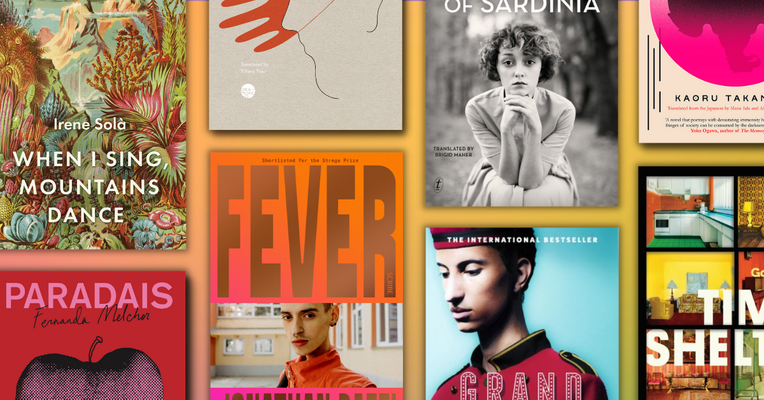
This month we’re reading novels translated from Dutch, Italian, Bulgarian and Catalan.
Grand Hotel Europa by Ilja Leonard Pfeijffer (translated from Dutch by Michele Hutchison)
A writer takes residence in the illustrious but decaying Grand Hotel Europa, to think about where things went wrong with Clio, with whom he fell in love in Genoa and moved to Venice. He reconstructs a compelling story of love in times of mass tourism, about their trips to Malta, Palmaria, Portovenere and the Cinque Terre and their thrilling search for the last painting of Caravaggio. Meanwhile, he becomes fascinated by the mysteries of Grand Hotel Europe and gets more and more involved with the memorable characters who inhabit it…
Grand Hotel Europa is Ilja Leonard Pfeijffer’s masterly novel on the old continent, where so much history resides that there is no place left for a future and where the most realistic future perspectives are offered in the form of exploiting the past in the shape of tourism.
Time Shelter by Georgi Gospodinov (translated from Bulgarian by Angela Rodel)
In Time Shelter, an enigmatic flaneur named Gaustine opens a ‘clinic for the past’ that offers a promising treatment for Alzheimer’s sufferers: each floor reproduces a decade in minute detail, transporting patients back in time.
As Gaustine’s assistant, the unnamed narrator is tasked with collecting the flotsam and jetsam of the past, from 1960s furniture and 1940s shirt buttons to scents and even afternoon light. But as the rooms become more convincing, an increasing number of healthy people seek out the clinic as a ‘time shelter’, hoping to escape from the horrors of our present - a development that results in an unexpected conundrum when the past begins to invade the present.
Fever by Jonathan Bazzi (translated from Italian by Alice Whitmore)
Jonathan is 31 years old, living in Milan with his boyfriend of three years and their two Devon Rex cats when, on a day like any other, he gets a fever. But unlike most, this fever doesn’t go away; it’s constant, low-level, and exhausting. After spending weeks Googling his symptoms and documenting his illness, he finally sees a doctor. A series of blood tests, anxious visits to hospitals, and repeated misdiagnoses ensue, until his doctor suggests an HIV test, and the truth is finally revealed: Jonathan is HIV-positive.
As Jonathan comes to terms with what this diagnosis will mean for him, his future, and his relationships, he also takes the reader back in time, in search of his history, to the suburbs where he grew up, and from which he feels he has escaped.
The Seamstress of Sardinia by Bianca Pitzorno (translated from Italian by Brigid Maher)
Born into poverty, the seamstress spends her days sewing in the houses of wealthy families. Her work is simple and honest; taught by her nonna, she skilfully prepares nightgowns, undergarments and children’s clothes, leaving the finer work of dressmaking to the ateliers in Paris.
Her story weaves in and out of the lives of the people she works for, whose secrets and scandals she is privy to. Some are kind and generous, others blinded by their desire to climb the social ladder. She dreams of freeing herself from the hardscrabble life she has inherited but can’t help being pulled back in by the love of the people around her.
When I Sing, Mountains Dance by Irene Sola (translated from Catalan by Mara Faye Lethem)
When Domenec - mountain-dweller, father, poet, dreamer - dies suddenly, struck by lightning, he leaves behind two small children, Mia and Hilari, to grow up wild among the looming summits of the Pyrenees and the ghosts of the Spanish civil war.
But then Hilari dies too, and his sister is forced to face life’s struggles and joys alone. As the years tumble by, the inhabitants of the mountain - human, animal and other - come together in a chorus of voices to bear witness to the sorrows of one family, and to the savage beauty of the landscape. This remarkable English-language debut is lyrical, mythical, elemental, and ferociously imaginative.


